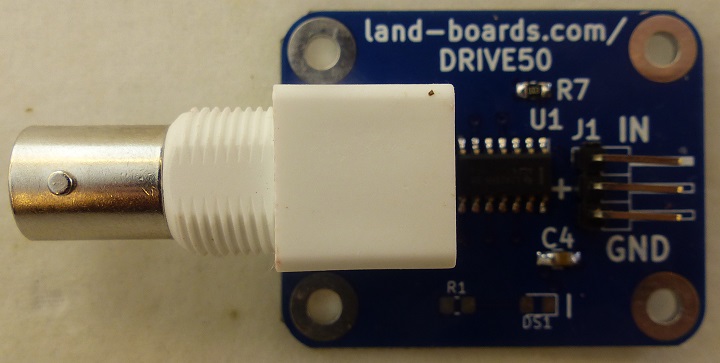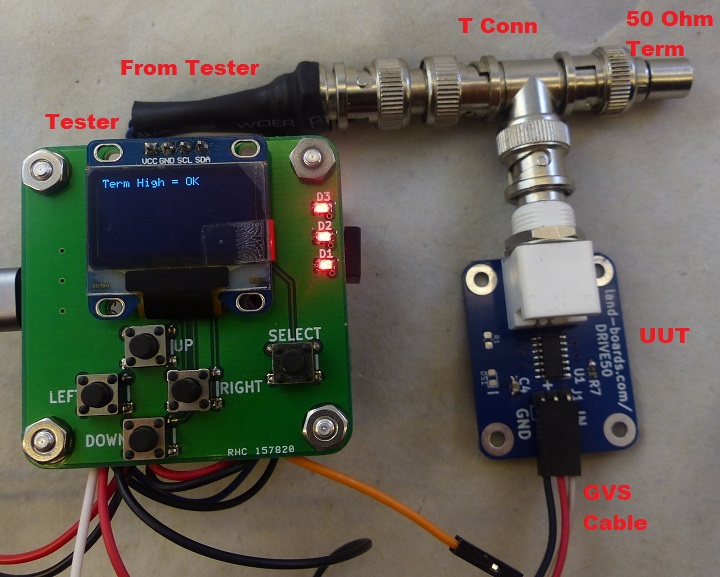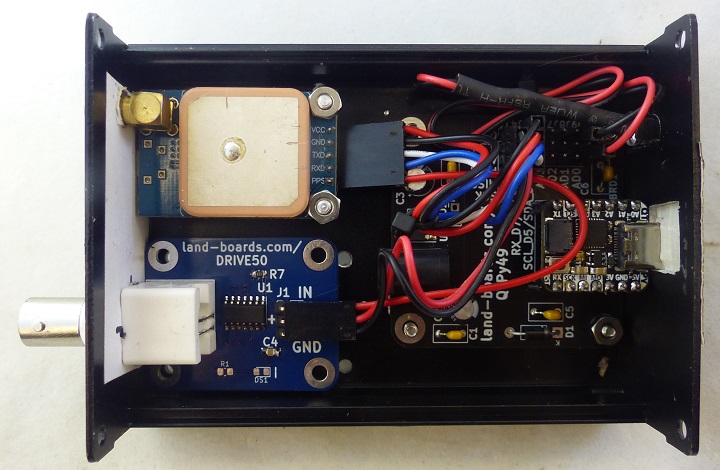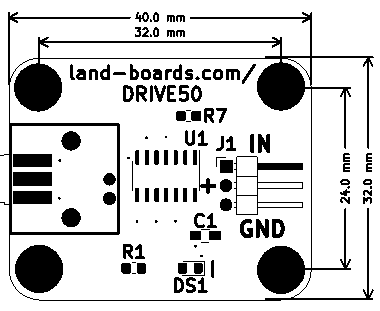Difference between revisions of "DRIVE50"
Jump to navigation
Jump to search
Blwikiadmin (talk | contribs) |
Blwikiadmin (talk | contribs) (→Driver) |
||
| Line 21: | Line 21: | ||
*** Symmetric high-low drive levels | *** Symmetric high-low drive levels | ||
** Short-circuit proof | ** Short-circuit proof | ||
| − | *** 5V, 250 Ohms to ground is 20 mA (pins are rated for 24 mA | + | *** 5V, 250 Ohms to ground is 20 mA (pins are rated for 24 mA) |
| + | *** 0.125 W resistor (5V output through 249 ohm resistor with output shorted to ground is 0.1 W) | ||
| + | *** 3.3V, 250 Ohms to ground is 13.2 mA (pins are rated for 24 mA) | ||
| + | *** 0.125 W resistor (3.3V output through 249 ohm resistor with output shorted to ground is 0.044 W) | ||
* Card input has single buffer stage | * Card input has single buffer stage | ||
* Schmitt Trigger Input | * Schmitt Trigger Input | ||
Revision as of 09:55, 31 July 2022
Contents
50 Ohm Driver Card
- "TTL" Level Line driver
- 50 or 75 Ohm output impedance
- BNC or SMA output connector
- 10K pull-up on input
- Card is non-inverting
- 1.5V-5.5V power
- Typically 3.3V or 5V
- 3-pin right angle 0.1" pitch input connector
- (4) 4-40 mounting holes
Driver
- 5x paralleled 74AC14 drivers
- 24mA per pin max current output
- Symmetric high-low drive levels
- Short-circuit proof
- 5V, 250 Ohms to ground is 20 mA (pins are rated for 24 mA)
- 0.125 W resistor (5V output through 249 ohm resistor with output shorted to ground is 0.1 W)
- 3.3V, 250 Ohms to ground is 13.2 mA (pins are rated for 24 mA)
- 0.125 W resistor (3.3V output through 249 ohm resistor with output shorted to ground is 0.044 W)
- 24mA per pin max current output
- Card input has single buffer stage
- Schmitt Trigger Input
- 3.3V, 250 Ohm resistors (/5) for 50 Ohm output
- Normal output = 10 mA per pin
Test
- Manual or Automated test methods
Manual Test Method
- Supply Vcc 3.3V to 5V and ground
- Input is pulled up to Vcc
- Measure output with BNC T
- Should be 1/2 of Vcc with 50 Ohm terminator
- Should be Vcc without terminator
Automated Test Software Method
Setup
- QTPy49
- QT_Py_(RP2040_based)
- Analog cable
- GVS Cable to A1
- Analog in (BNC) to A0 on QTPy49
- MyMenu
- Power card options
- Connect USB-C to the QT_Py_(RP2040_based) or
- Power from 9-12V to DC jack
- Cables
- USB-C (power option)
- Power cable to UUT
- Terminator - dependent on build option
- 50 Ohms
- 75 Ohms
- Unit Under Test (UUT)
- PulseGen_DRIVE50_Test.py - Test software for PulseGen and DRIVE50 cards
- Stored as code.py on QT_Py_(RP2040_based) to auto-run
- Auto-detects card type
Procedure
- Connect 3 pin power cable to card
- Connect BNC T to output of card
- Connect BNC female from tester to BNC T male
- Install 50 terminator to other side of BNC T
- Connect USB C cable
- Display will show
PulseGen/DRIVE50 V1.1 50 Ohm card Set/Got Low Term High = OK
- All 3 LEDs are on
Application Example
GPS Frequency Standard
- GPS Frequency Standard
- Card takes in PPS signal out of GPS module and drives 50 Ohm, 10 MHz Frequency Standard output on coax via BNC connector




